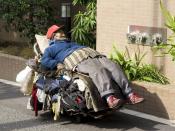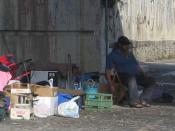Women on the Street
Have you ever rushed down the street and felt that nagging feeling of
guilt, as you breeze by someone lying in a doorway? Is she alive? Is she
ill? Why do we all rush by without finding out is she's all right?
People sit in train stations, bus stations, parks, doorways,
unmistakably sick, with what, we don't know. All are seemingly alone.
Some beg. Some don't. Some have open sores that ooze and bleed.
Some are drunk. Some talk to themselves or formless others. They have
no homes.
Street people make up a small percentage of the homeless
population. Most homeless people blend into the daily flow of urban life.
Many families are homeless. Many babies go from the hospital into the
shelter system, never knowing what it is like to go home. Women are
another subgroup of the homeless.
Solutions to homelessness are not easily found.
But before we can
solve problems, we must be sensitive enough that we create the will to find
the solutions. Often if we do not feel the problem, if some emotional
response is not made, we are not moved to seek solutions. We are often
unmoved to even recognize the questions. We cannot afford to keep
walking by.
'Work is a fundamental condition of human existence,' said Karl Marx.
In punch-the-clock and briefcase societies no less than in agricultural or
hunting and gathering societies, it is the organization of work that makes life
in communities possible. Individual life as well as social life is closely tied to
work. In wage labored societies, and perhaps in every other as well, much
of an individual's identity is tied to their job. For most people jobs are a
principal source of both independence and correctness to others. It should
come as...


